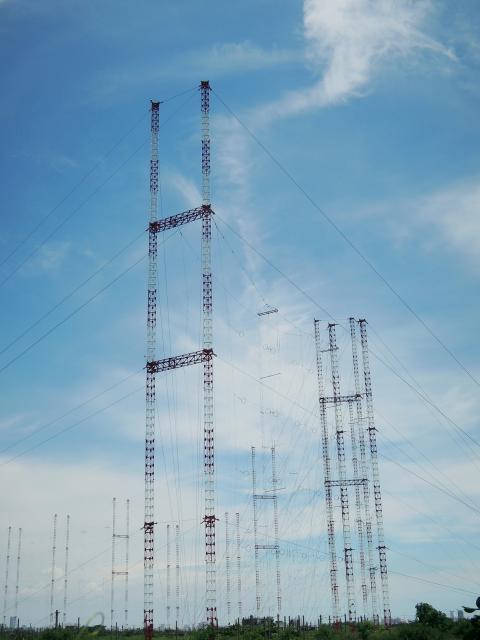Three US congressional members have written to President Ma Ying-jeou (馬英九) to protest plans to tear down two shortwave radio towers in Yunlin County’s Huwei Township (虎尾) and in Greater Tainan.
They say the towers — at least partly built with US funds — may still be needed to broadcast uncensored news into China.
The towers are being used by Falun Gong and its media organization, the Sound of Hope Radio Network, to transmit broadcasts that are critical of the Chinese government and its human rights record.

Photo: Taipei Times
A statement issued by Falun Gong in Washington on Monday said that Radio Taiwan International (RTI) had already begun tearing down the towers in Greater Tainan and that requests from the US Congress to stop the demolition were being ignored.
The statement said that Beijing was putting “huge pressure” on Taiwan to stop shortwave broadcasts aimed at China.
It said that RTI had changed its mission from spreading “freedom and democracy to China” to marketing and promoting Taiwan.
The statement said the towers were built in the 1960s and 1970s, several with funding from the US military.
“RTI plans to close two major radio facilities, Huwei and Tainan substations,” it said.
It said the two radio stations had 28 shortwave radio towers equipped with antennae with a transmission power of at least 2,700 kilowatts and could cover all of China.
“The Chinese Communist Party is very scared about the power of these towers and they want the towers to be demolished,” the statement signed by Sound of Hope Radio Network president Allen Zeng said.
“Any plan to tear down these facilities is premature and should be suspended pending analysis of other potential use of the facilities,” US Representative Frank Wolf wrote in a letter to Ma.
“Any demolitions that would reduce the capability to transmit into China should be halted until alternatives can be fully explored,” US Representative Dana Rohrabacher wrote in another letter to Ma.
US Representative Christopher Smith has also written to the president to express his concern that “any teardown would undermine the purpose for which these facilities were built” and would deprive US broadcasters of a chance to save expenses.
“I believe that any plan to tear down the Tainan and Huwei facilities should be delayed until their strategic utilization by international shortwave broadcasters is fully studied,” Smith said.
RTI Tainan substation director Tseng Wen-san (曾文三) yesterday said the plan to demolish the Greater Tainan facility was made due to a river expansion project and had nothing to do with “the Chinese communists.”
“It is an established policy that the Tian Ma Radio Station [the Tainan substation] will be relocated to Yunlin County’s Baojhong Township (褒忠),” he said, adding: “After the relocation to Yunlin, no changes will be made to our international radio broadcasts.”
Additional reporting by Tsai Wen-chu

MISINFORMATION: The generated content tends to adopt China’s official stance, such as ‘Taiwan is currently governed by the Chinese central government,’ the NSB said Five China-developed artificial intelligence (AI) language models exhibit cybersecurity risks and content biases, an inspection conducted by the National Security Bureau (NSB) showed. The five AI tools are: DeepSeek, Doubao (豆包), Yiyan (文心一言), Tongyi (通義千問) and Yuanbao (騰訊元寶), the bureau said, advising people to remain vigilant to protect personal data privacy and corporate business secrets. The NSB said it, in accordance with the National Intelligence Services Act (國家情報工作法), has reviewed international cybersecurity reports and intelligence, and coordinated with the Ministry of Justice Investigation Bureau and the National Police Agency’s Criminal Investigation Bureau to conduct an inspection of China-made AI language

BOOST IN CONFIDENCE: The sale sends a clear message of support for Taiwan and dispels rumors that US President Donald Trump ‘sold out’ the nation, an expert said The US government on Thursday announced a possible sale to Taiwan of fighter jet parts, which was estimated to cost about US$330 million, in a move that an expert said “sends a clear message of support for Taiwan” amid fears that Washington might be wavering in its attitude toward Taipei. It was the first announcement of an arms sale to Taiwan since US President Donald Trump returned to the White House earlier this year. The proposed package includes non-standard components, spare and repair parts, consumables and accessories, as well repair and return support for the F-16, C-130 and Indigenous Defense Fighter aircraft,

CHECKING BOUNDARIES: China wants to disrupt solidarity among democracies and test their red lines, but it is instead pushing nations to become more united, an expert said The US Department of State on Friday expressed deep concern over a Chinese public security agency’s investigation into Legislator Puma Shen (沈伯洋) for “secession.” “China’s actions threaten free speech and erode norms that have underpinned the cross-strait ‘status quo’ for decades,” a US Department of State spokesperson said. The Chongqing Municipal Public Security Bureau late last month listed Shen as “wanted” and launched an investigation into alleged “secession-related” criminal activities, including his founding of the Kuma Academy, a civil defense organization that prepares people for an invasion by China. The spokesperson said that the US was “deeply concerned” about the bureau investigating Shen

LIMITS: While China increases military pressure on Taiwan and expands its use of cognitive warfare, it is unwilling to target tech supply chains, the report said US and Taiwan military officials have warned that the Chinese People’s Liberation Army (PLA) could implement a blockade within “a matter of hours” and need only “minimal conversion time” prior to an attack on Taiwan, a report released on Tuesday by the US Senate’s China Economic and Security Review Commission said. “While there is no indication that China is planning an imminent attack, the United States and its allies and partners can no longer assume that a Taiwan contingency is a distant possibility for which they would have ample time to prepare,” it said. The commission made the comments in its annual